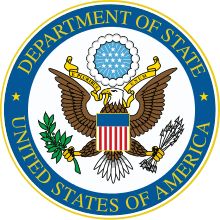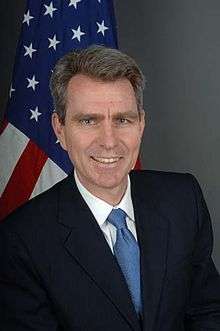United States Ambassador to Greece
| Ambassador of the United States to Greece | |
|---|---|
|
Seal of the United States Department of State | |
| Nominator | Barack Obama |
| Inaugural holder |
Charles Keating Tuckerman as Minister |
| Formation | 1868 |
| Website | U.S. Embassy - Athens |
U.S. diplomatic terms
Career FSO
After 1915, The United States Department of State began classifying ambassadors as career Foreign Service Officers (FSOs) for those who have served in the Foreign Service for a specified amount of time.
Political appointee
A person who is not a career foreign service officer, but is appointed by the president (often as a reward to political friends).
Appointed
The date that the ambassador took the oath of office; also known as “commissioning”. It follows confirmation of a presidential appointment by the Senate, or a Congressional-recess appointment by the president. In the case of a recess appointment, the ambassador requires subsequent confirmation by the Senate.
Presented credentials
The date that the ambassador presented his letter of credence to the head of state or appropriate authority of the receiving nation. At this time the ambassador officially becomes the representative of his country. This would normally occur a short time after the ambassador’s arrival on station. The host nation may reject the ambassador by not receiving the ambassador’s letter, but this occurs only rarely.
Terminated mission
Usually the date that the ambassador left the country. In some cases a letter of recall is presented, ending the ambassador’s commission, either as a means of diplomatic protest or because the diplomat is being reassigned elsewhere and replaced by another envoy.
Chargé d'affaires
The person in charge of the business of the embassy when there is no ambassador commissioned to the host country. See chargé d'affaires.
Ad interim
Latin phrase meaning "for the time being", "in the meantime". See ad interim.
After 1915, The United States Department of State began classifying ambassadors as career Foreign Service Officers (FSOs) for those who have served in the Foreign Service for a specified amount of time.
Political appointee
A person who is not a career foreign service officer, but is appointed by the president (often as a reward to political friends).
Appointed
The date that the ambassador took the oath of office; also known as “commissioning”. It follows confirmation of a presidential appointment by the Senate, or a Congressional-recess appointment by the president. In the case of a recess appointment, the ambassador requires subsequent confirmation by the Senate.
Presented credentials
The date that the ambassador presented his letter of credence to the head of state or appropriate authority of the receiving nation. At this time the ambassador officially becomes the representative of his country. This would normally occur a short time after the ambassador’s arrival on station. The host nation may reject the ambassador by not receiving the ambassador’s letter, but this occurs only rarely.
Terminated mission
Usually the date that the ambassador left the country. In some cases a letter of recall is presented, ending the ambassador’s commission, either as a means of diplomatic protest or because the diplomat is being reassigned elsewhere and replaced by another envoy.
Chargé d'affaires
The person in charge of the business of the embassy when there is no ambassador commissioned to the host country. See chargé d'affaires.
Ad interim
Latin phrase meaning "for the time being", "in the meantime". See ad interim.
List of Ambassadors
List of ambassadors from the United States to Greece.[1]
- 1868–1899
- Charles Keating Tuckerman (Minister 1868–71)
- John M. Francis (Minister 1871–73)
- John M. Read, Jr. (Minister 1873–77)
- John M. Read, Jr. (Chargé d'Affaires 1877–79)
- Eugene Schuyler (Minister 1882–84)
- Walker Fearn (Minister 1885–89)
- A. Loudon Snowden (Minister 1889–92)
- Truxtun Beale (Minister 1892–93)
- Eben Alexander (Minister 1893–97)
- William W. Rockhill (Minister 1897–99)
- 1899–1942
- Arthur Sherburne Hardy (Minister 1899–1901)
- Charles Spencer Francis (Minister 1901–02)
- John Brinkerhoff Jackson (Minister 1902–07)
- Richmond Pearson (Minister 1907–09)
- George H. Moses (Minister 1909–12)
- Jacob Gould Schurman (Minister 1912–13)
- George F. Williams (Minister 1913–14)
- Garrett Droppers (Minister 1914–20)
- Edward Capps (Minister 1920)
- Irwin Laughlin (Minister 1924–26)
- Robert Peet Skinner (Minister 1926–32)
- Lincoln MacVeagh (Minister 1933–41)
- A. J. Drexel Biddle, Jr. (Minister 1941–42)
- 1942–1997
- A. J. Drexel Biddle, Jr. (Ambassador 1942–43)
- Alexander C. Kirk (Ambassador 1943)
- Lincoln MacVeagh (Ambassador 1943–47)
- Henry F. Grady (Ambassador 1948–50)
- John Emil Peurifoy (Ambassador 1950–53)
- Cavendish W. Cannon (Ambassador 1953–56)
- George V. Allen (Ambassador 1956–57)
- James W. Riddleberger (Ambassador 1958–59)
- Ellis O. Briggs (Ambassador 1959–62)
- Henry Richardson Labouisse, Jr. (Ambassador 1962–65)
- Phillips Talbot (Ambassador 1965–69)
- Henry J. Tasca (Ambassador 1969–74)
- Jack Bloom Kubisch (Ambassador 1974–77)
- Robert J. McCloskey (Ambassador 1978–81)
- Monteagle Stearns (Ambassador 1981–85)
- Robert Vossler Keeley (Ambassador 1985–89)
- Michael G. Sotirhos (Ambassador 1989–93)
- Thomas M. T. Niles (Ambassador 1993–97)
- 1997–Present
- R. Nicholas Burns (Ambassador 1997–2001)
- Thomas J. Miller (Ambassador 2001–04)
- Charles P. Ries (Ambassador 2004–07)
- Daniel V. Speckhard (Ambassador 2007–10)
- Daniel Bennett Smith (Ambassador 2010–2013)
- David D. Pearce (Ambassador 2013–2016)
- Geoffrey R. Pyatt (Ambassador 2016–)[2]
Notes
The U.S. Embassy in Athens was closed July 14, 1941, after the German occupation of Greece. The United States maintained diplomatic relations with the government-in-exile of Greece in London (1941–43) and then in Cairo (1943–44). Ambassador MacVeagh reopened the embassy on October 27, 1944.[3]
The U.S. Legation was raised to Embassy status on September 29, 1942. This action also would promote Minister Biddle to the rank of Ambassador, which required a new appointment. The appointment was promptly made by President Roosevelt and confirmed by the Senate. Ambassador Biddle presented his credentials to the government of Greece on October 30, 1942.[3]
See also
- Embassy of the United States, Athens
- Greece – United States relations
- Foreign relations of Greece
- Ambassadors of the United States
References
- ↑ Political Graveyard
- ↑ "President Obama Announces More Key Administration Posts" (Press release). White House Press Office. May 19, 2016.
- 1 2 "Greece". U.S. Department of State. Retrieved 2011-05-10.
- United States Department of State: Background notes on Greece
 This article incorporates public domain material from the United States Department of State website http://www.state.gov/r/pa/ei/bgn/index.htm (Background Notes).
This article incorporates public domain material from the United States Department of State website http://www.state.gov/r/pa/ei/bgn/index.htm (Background Notes).
External links
- United States Department of State: Chiefs of Mission for Greece
- United States Department of State: Greece
- United States Embassy in Athens
This article is issued from Wikipedia - version of the 10/4/2016. The text is available under the Creative Commons Attribution/Share Alike but additional terms may apply for the media files.

